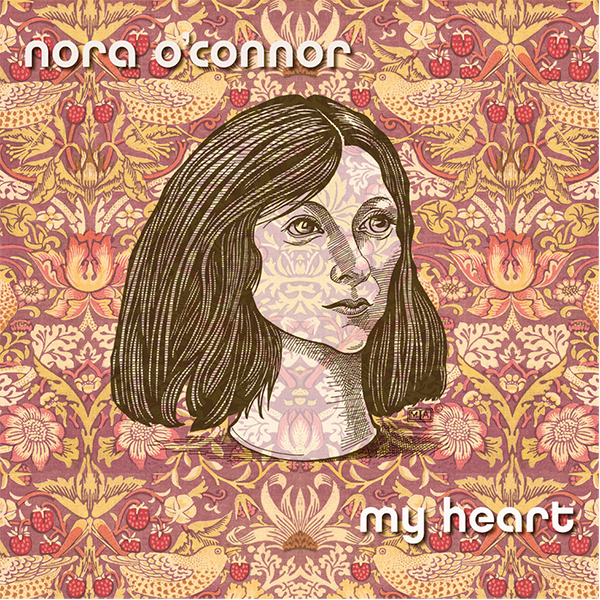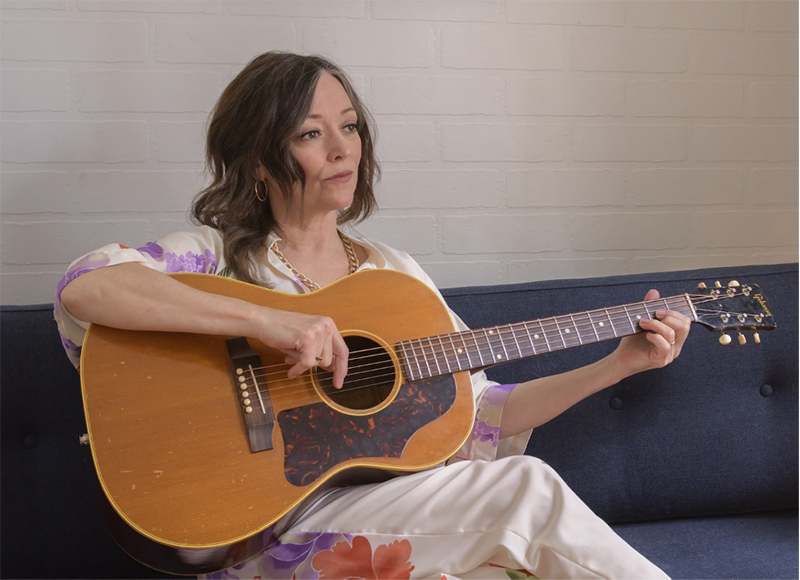Singer, guitarist and bassist Nora O’Connor has shared the stages with the likes of The Decemberists, Iron and Wine, Neko Case, and others, fulfilling a lifelong dream of transcending boundaries through music.
But if her latest record, My Heart, is any indication, Nora O’Connor is never more herself than when she’s driving her message home through her own music. As one of indie music’s most plaintive troubadours, O’Connor’s music is akin to coming back to a warm home on a chilly evening in the dead of winter.
Overall, the record has something for everyone, but what’s most striking is the gritty honesty echoing from the veteran songstress’s voice on cuts such as “Follow Me,” “Grace,” and “Tarot Card.”
O’Connor is a throwback from a different time and a different space, that of the nomadic traveler whose vintage aesthetic and delicate guitar stylings pair gorgeously with her well-worn, road-weary voice. If you’re looking for a low-key album with a lot of heart and vibe to round your year out, or a soundtrack for long fall drives to nowhere, give My Heart a try.
As she contemplates her future, Nora O’Connor settled in with me to recount her earliest musical memories, the evolution of her songwriting process, the recording of My Heart, and what’s next for her.

Andrew Daly: When did you know you wanted to make music your career?
Nora O’Connor: When I was in college, I started a band with my new buddies; we were half locals, half students. We sang Crosby, Stills, Nash & Young, the Beatles, the Stones, the Dead, America, and more Crosby, Stills, Nash and Young. (laughs) Those were the first people I sang with, and I realized [I had a] knack for harmony and blending [in] vocals. I really started to feel the electricity that happens when you lock into the harmonies of a song. It was incredibly fulfilling and fun. I began to play guitar around that time, and it didn’t take long before I was playing it in front of people. I somehow knew that was the only way to get mediocre fast!
AD: Which artists influenced you most when you were young, and how have you evolved since?
NOC: When I was a kid and into my teens, I loved Pat Benatar, Heart, Eurythmics, Rickie Lee Jones, Kate Bush, Paul Rodgers, Steve Perry, and oh god, did I love Donna Summer. I would sing right into the speaker and try to lock in with Donna’s voice; I did that all the time when I wasn’t singing into a hairbrush. (laughs) But as I’ve gotten older, I’m starting to settle into the parts of my voice that are the most comfortable, and it helps to know what I cannot do, so I don’t hurt myself anymore. Also, I think my control and confidence have evolved, and I feel that it shows in my voice and approach.
AD: Can you dive deeper into the college scene you were exposed to?
NOC: I played a lot when I was in college at Southern Illinois University. We had great little joints like PK’s, Bobby’s Beer Garden, and the Pinch Penny Pub. When I moved to Chicago, I did a lot of open mics and opening slots at places like No Exit and Uncommon Ground coffee house. Eventually, I started playing small clubs like Schubas and The Hideout, and I still do.
AD: What was the songwriting process for My Heart like?
NOC: Around mid-summer 2020, I started booking little yard shows around my town. This was back when nothing else was happening, and it felt very nourishing to be with a few people for a couple of hours and play music. I wrote a couple of songs for those gigs, and it felt pretty good to see what was inside of me. Having a break from touring with other bands, I wanted to fill my solo set with more original material. I liked what was coming out and wanted the experience of recording my own music. It was an exercise of trusting myself and getting over myself.
AD: Describe your thought process going into the record.
NOC: For a long time, I was insecure and intimidated by the musicians that I worked with and for. I was in a headspace where I thought, why bother? Well, that kind of self-sabotage was getting exhausting, so I quit drinking at the beginning of the pandemic, and that made room for me to dig a little deeper and find what I have to offer musically, spiritually, for my relationships, the whole deal. From there, I took a couple of writing classes to invite discipline into my day and open up my creative senses.
AD: What was your approach to the production for My Heart?
NOC: Working with Alex Hall at Reliable Recorders in Chicago was a no-brainer for me. We [had] made two records together with the Flat Five, who Alex plays drums for. And I’ve come into his studio for many sessions over the years, and I know that Alex knows what mics are good for my voice, and he already had a good feel for my aesthetic. Plus, I was a fan of so many of the records he’s recorded, engineered, and produced. I also did some recording at Steve Dawson’s Kernel Sound Emporium in Chicago. I loved the way his records were turning out and trusted [that] he would be a great person to work with on a few of my songs.

Nora O’Connor.
AD: How has working with artists like the Decemberists, Neko Case, Andrew Bird, and Iron and Wine changed your perspective?
NOC: It feels like I’ve been in a master class for the last 20-plus years, working with these music warriors on stage and offstage too. A show [lasts] two or three hours, so many tours are [really what happens in] the 19 hours between shows, and learning to co-exist with as many as 17 people. Morning coffees on the bus, reading the news on our phones and talking about the issues abound, and I devoured pre- and post-show playlists, learning so much about music I’d never heard. You would be surprised how much you could learn about Loverboy’s first drummer. (laughs)
AD: What’s next for you, Nora?
NOC: I will always do this on some level. I have lots of shows planned regionally and am trying to book a living room tour. For the record, booking your own tours blows. (laughs) I’m at a point in my life where I can’t take the car and drive around the country paying to play anymore. I have to be smart about what I can do. I love small, intimate, unconventional listening rooms like house concerts, art galleries, and yes, even libraries. So, I want to do more of that and plan to do it as often as possible.
Images courtesy of Nora O’Connor/Howlin’ Wuelf Media.













0 comments